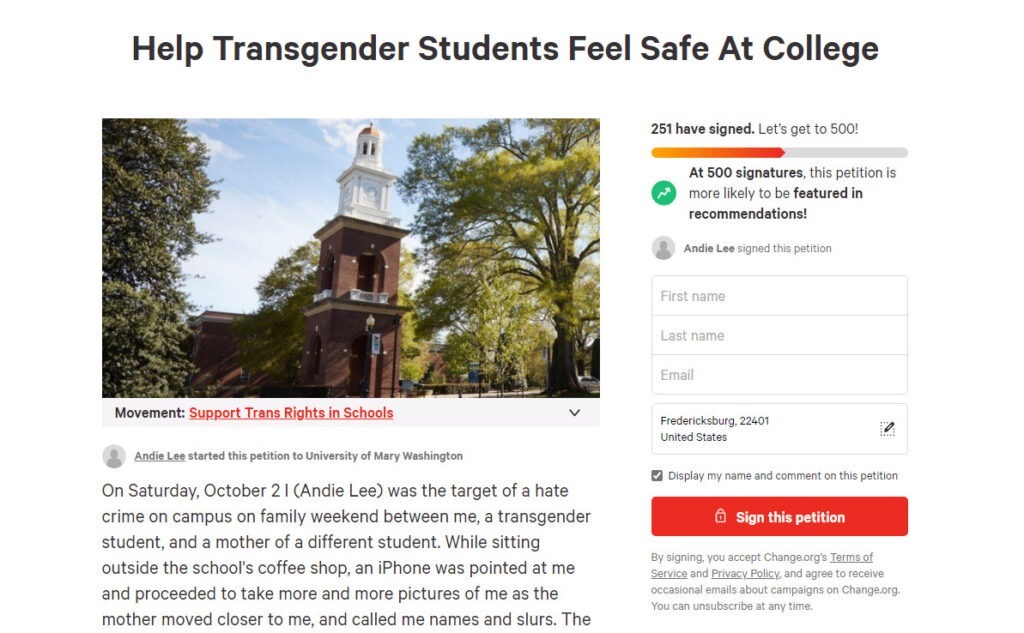Petition calls for protections for transgender students
4 min read
The petition currently has 151 signatures. | Andie Lee / Change.org
by SAMUEL CREEMER
Staff Writer
On Oct. 2, undecided junior Andie Lee was verbally harassed and photographed outside of Katora cafe on campus by a parent who was touring the UMW campus. Lee, a transgender student who uses they/them pronouns, started a Change.org petition in response. As of publication, the petition has 251 signatures.
The petition is titled “Help Transgender Students Feel Safe at College” and calls on the university to take four courses of action to better protect students under the guidance of The Clery Act.
The first action the petition calls for is to make it easier for students to report bias incidents. In the petition, Lee states that multiple professors were unable to point them to the correct resource to report their incident to the university.
Next, the petition calls for the university to clarify what on-campus incidents count as hate crimes and what the administration is doing to protect students on campus. The third action calls for CCTV footage to be more easily accessible to students who have been victims of on-campus hate crimes.
“There are multiple CCTV cameras around the area, and professors not having knowledge on how to report hate crimes delayed what could have been justice for me and other transgender students on UMW’s campus,” said Lee on the petition.
The last action that the petition calls for is for the university to facilitate emergency appointments with trained therapists for victims of hate crimes.
Hope Mills, a senior biology and classics double major, found the petition through Instagram and signed it because she wants all students to feel safe.
“The demands would benefit everyone on campus when an incident occurs and help faculty be better at responding to students in these situations,” she said. “If we have cameras on campus that capture incidents, why aren’t we able to access them for reporting?”
Mills questions the school’s emphasis on safety.
“UMW boasts about its safety and inclusivity, but clearly they’re not following through,” she said.
Lee hopes the petition will bring light to what is defined as a hate crime on campus.
Hate crimes are defined on UMW’s website as “criminal acts, illegal acts and other incidents as determined by law enforcement authority, that are motivated by race, religion, gender, disability, gender identity, sexual orientation, or ethnic or national origin.”
“My goal was to not help myself because my case was already done at that point, but to help other future students who might be in a situation of a hate crime,” said Lee. “All hate crimes don’t end up leading to you in a hospital; some can just lead to intimidation, so I want campus administration to know what a hate crime is and how we can deal with them on campus safely.”
Vice President of Student Affairs Juliette Landphair believes hate incidents are cause for concern.
“[Campus administration is] always concerned about bias incidents,” she said. “Hate incidents and hate crimes hamper the educational mission of UMW. When we are made aware of an incident, we investigate it fully.”
Additionally, this petition was discussed at a recent town hall facilitated by the Student Government Association (SGA). There were several members of the university administration present at this meeting, and a variety of campus safety issues were discussed, including Lee’s harassment incident.
However, some students were disappointed in the administration’s responses to students’ concerns.
“I felt like it was just unacceptable,” said Lee. “I had friends at the town hall who were asking questions about their issues and I was asking questions about my deal, and it did not feel like we were getting straight answers.”
Landphair believes some of the information Lee is asking for has been conveyed.
”Speaking for myself, I believe that important information about what happens in the Title IX process and sex and gender-based prevention and education was conveyed, as well as information about the context of extremism and why extremist and white supremacist groups target college campuses,” she said. “As Vice President for Student Affairs, I always listen for the impact of situations on students so we can learn from that impact.”
Lee acknowledges progress has been made overall, but still desires to feel safe on campus.
“I think we should take away at the end of this that we have made progress about LGBTQ rights,” said Lee. “A lot of people are allowed to marry each other now, and some places have protections for LGBTQ workers, but on campus it is still a hostile place. That is my main message coming out of this. Campus is still hostile.”
Bernadette D’Auria contributed to reporting for this article.


